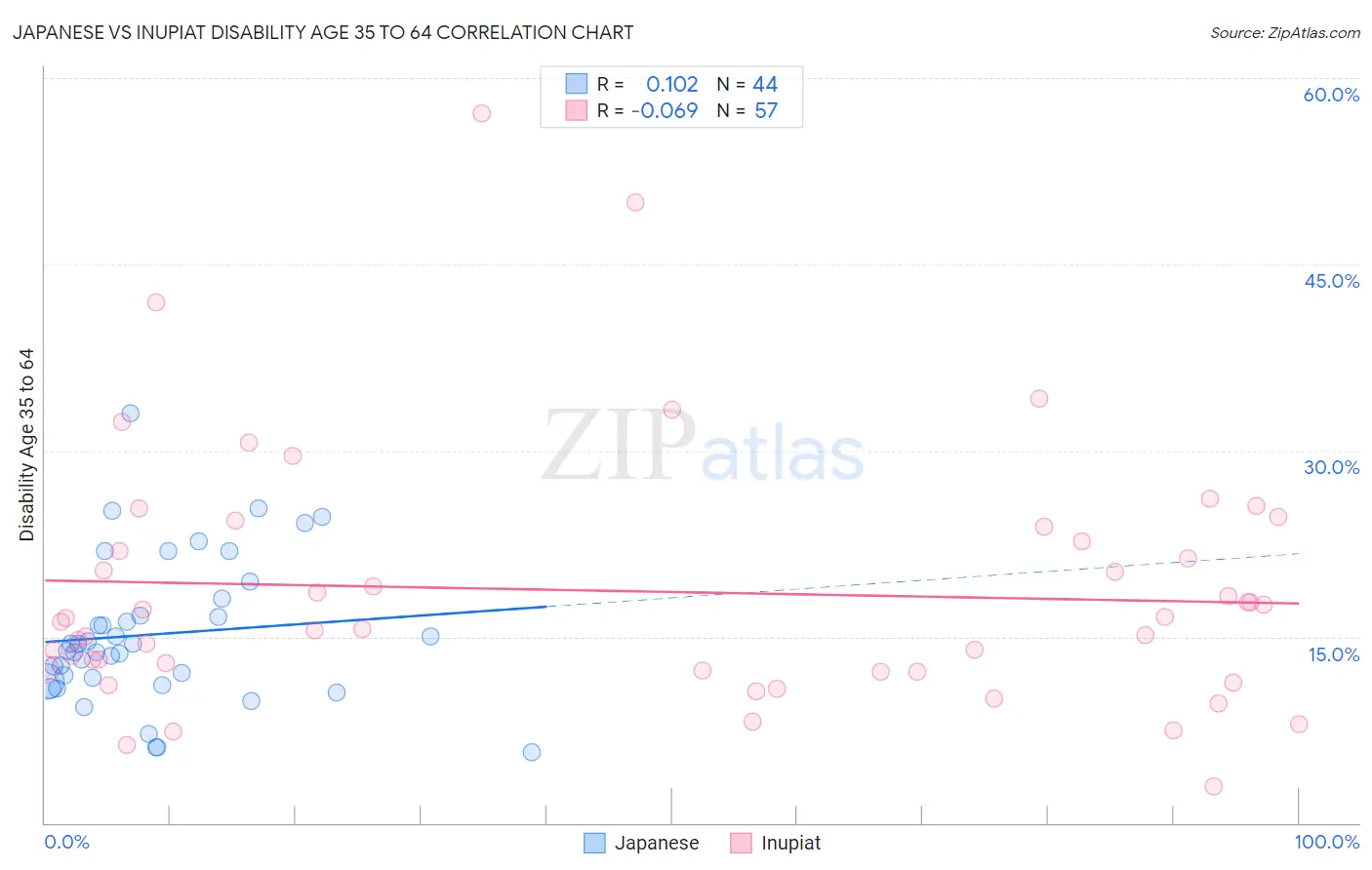Japanese vs Inupiat Disability Age 35 to 64
COMPARE
Japanese
Inupiat
Disability Age 35 to 64
Disability Age 35 to 64 Comparison
Japanese
Inupiat
12.3%
DISABILITY AGE 35 TO 64
0.8/ 100
METRIC RATING
255th/ 347
METRIC RANK
14.1%
DISABILITY AGE 35 TO 64
0.0/ 100
METRIC RATING
308th/ 347
METRIC RANK
Japanese vs Inupiat Disability Age 35 to 64 Correlation Chart
The statistical analysis conducted on geographies consisting of 249,049,051 people shows a poor positive correlation between the proportion of Japanese and percentage of population with a disability between the ages 34 and 64 in the United States with a correlation coefficient (R) of 0.102 and weighted average of 12.3%. Similarly, the statistical analysis conducted on geographies consisting of 96,326,282 people shows a slight negative correlation between the proportion of Inupiat and percentage of population with a disability between the ages 34 and 64 in the United States with a correlation coefficient (R) of -0.069 and weighted average of 14.1%, a difference of 13.9%.

Disability Age 35 to 64 Correlation Summary
| Measurement | Japanese | Inupiat |
| Minimum | 5.7% | 2.9% |
| Maximum | 33.0% | 57.1% |
| Range | 27.4% | 54.2% |
| Mean | 15.2% | 18.7% |
| Median | 14.1% | 16.2% |
| Interquartile 25% (IQ1) | 11.5% | 12.2% |
| Interquartile 75% (IQ3) | 17.4% | 23.3% |
| Interquartile Range (IQR) | 5.9% | 11.1% |
| Standard Deviation (Sample) | 5.8% | 10.3% |
| Standard Deviation (Population) | 5.7% | 10.2% |
Similar Demographics by Disability Age 35 to 64
Demographics Similar to Japanese by Disability Age 35 to 64
In terms of disability age 35 to 64, the demographic groups most similar to Japanese are Hawaiian (12.3%, a difference of 0.13%), Scottish (12.4%, a difference of 0.17%), Dutch (12.3%, a difference of 0.25%), Irish (12.3%, a difference of 0.28%), and Mexican (12.4%, a difference of 0.42%).
| Demographics | Rating | Rank | Disability Age 35 to 64 |
| Spaniards | 1.3 /100 | #248 | Tragic 12.3% |
| Hispanics or Latinos | 1.3 /100 | #249 | Tragic 12.3% |
| Immigrants | Burma/Myanmar | 1.2 /100 | #250 | Tragic 12.3% |
| Germans | 1.1 /100 | #251 | Tragic 12.3% |
| Irish | 1.0 /100 | #252 | Tragic 12.3% |
| Dutch | 1.0 /100 | #253 | Tragic 12.3% |
| Hawaiians | 0.9 /100 | #254 | Tragic 12.3% |
| Japanese | 0.8 /100 | #255 | Tragic 12.3% |
| Scottish | 0.8 /100 | #256 | Tragic 12.4% |
| Mexicans | 0.7 /100 | #257 | Tragic 12.4% |
| Welsh | 0.6 /100 | #258 | Tragic 12.4% |
| English | 0.6 /100 | #259 | Tragic 12.4% |
| German Russians | 0.5 /100 | #260 | Tragic 12.5% |
| Malaysians | 0.5 /100 | #261 | Tragic 12.5% |
| Senegalese | 0.5 /100 | #262 | Tragic 12.5% |
Demographics Similar to Inupiat by Disability Age 35 to 64
In terms of disability age 35 to 64, the demographic groups most similar to Inupiat are Blackfeet (14.1%, a difference of 0.030%), Cree (14.1%, a difference of 0.070%), Immigrants from Yemen (14.0%, a difference of 0.19%), Cape Verdean (14.1%, a difference of 0.54%), and American (13.9%, a difference of 1.1%).
| Demographics | Rating | Rank | Disability Age 35 to 64 |
| French American Indians | 0.0 /100 | #301 | Tragic 13.7% |
| Aleuts | 0.0 /100 | #302 | Tragic 13.8% |
| Sioux | 0.0 /100 | #303 | Tragic 13.9% |
| Hopi | 0.0 /100 | #304 | Tragic 13.9% |
| Americans | 0.0 /100 | #305 | Tragic 13.9% |
| Immigrants | Yemen | 0.0 /100 | #306 | Tragic 14.0% |
| Blackfeet | 0.0 /100 | #307 | Tragic 14.1% |
| Inupiat | 0.0 /100 | #308 | Tragic 14.1% |
| Cree | 0.0 /100 | #309 | Tragic 14.1% |
| Cape Verdeans | 0.0 /100 | #310 | Tragic 14.1% |
| Immigrants | Azores | 0.0 /100 | #311 | Tragic 14.3% |
| Paiute | 0.0 /100 | #312 | Tragic 14.3% |
| Iroquois | 0.0 /100 | #313 | Tragic 14.4% |
| Shoshone | 0.0 /100 | #314 | Tragic 14.5% |
| Alaska Natives | 0.0 /100 | #315 | Tragic 14.5% |